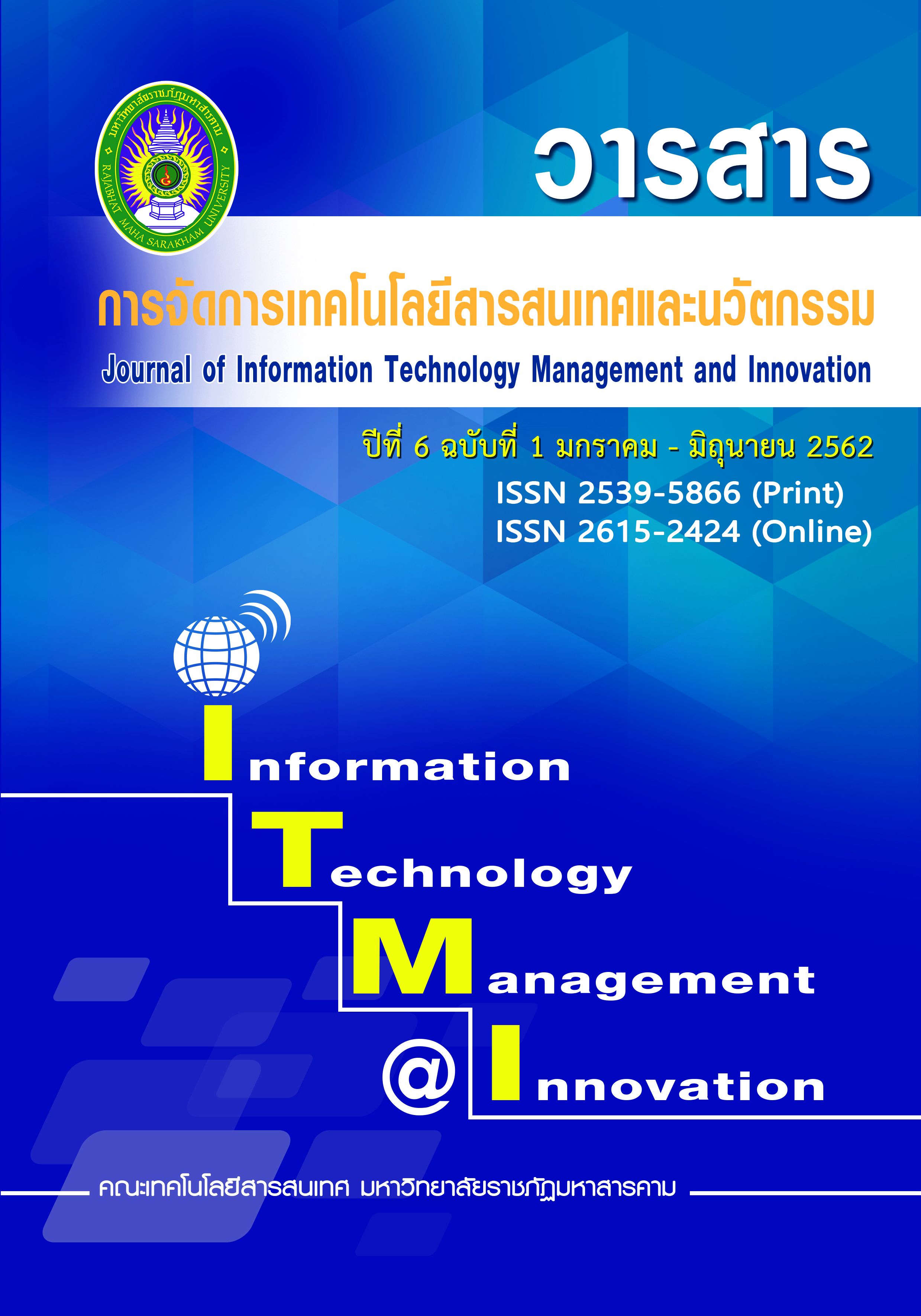The Components Synthesis of Handbook of Good Practice Evaluation for Online Professional Learning Community of Teachers by EDFR Technique
Main Article Content
Abstract
Abstract
The objective of the research was to synthesize the components of a handbook on evaluating the best practice of an online learning community for teaching profession by EDFR technique. The target population was twenty one specialists selected by purposive sampling. The instrument was 1) an interview form of the first time by using EDFR technique, a questionnaire on the handbook 2) a questionnaire on the handbook in the second time of EDFR technique and 3) a questionnaire on the handbook in the third time of EDFR technique. The statistics used were mean and standard deviation.
The research study focused on 1) types of teachers’ work, 2) components of an information system, 3) work assessment, 4) assessment method, and 5) scoring for work assessment. The researcher used one hundred and forty four items of five areas for designing three tasks. 1) The components of a handbook on evaluating the best practice of an online learning community for teaching profession consisted of three target groups: teachers, system administrators and work assessors. 2) A system management module for evaluating the best practice of an online learning community for teaching profession consisted of seven modules: 1) system administrators/ officers, 2) online learning community for teaching profession, 3) communication module/connection, 4) members/work’s owners, 5) works, 6) assessors and criteria for work assessment. And 3) the monitor screen of the best management system consisted of five parts: 3.1) showing data/pictures/logo of an organization/community and menus, 3.2) menu for sending works, documents and related activities, 3.3) details of contents, 3.4) a registration system and connection with other organization, 3.5) showing data of system development/ system connection. The average opinion of the specialists towards the appropriateness of the system design of the management system for evaluating the best practice of the online learning community for teaching profession was at the highest level. The three most appropriate modules were seven modules of the management system components, 2) five parts of component design, and handbook for teachers or work senders.
Article Details
References
[2] สำนักงานเลขาธิการสภาการศึกษา. (2553). สมรรถนะการศึกษาไทยในเวทีสากล พ.ศ. 2552. กรุงเทพฯ: ผู้แต่ง.
[3] สิวรี พิศุทธิ์สินธพ. (2553). รูปแบบการพัฒนาชุมชนแห่งการเรียนรู้เชิงวิชาชีพในสถาบันอุดมศึกษาคาทอลิก. วารสารศึกษาศาสตร์, 22(2), 115-127.
[4] Kruse, S.D., Louis, K.S., & Bryk, A. (1995). An emerging framework for analyzing School based professional community. In Professionalalism and Community: Perspectives on Reforming Urban Schools (pp. 23-42). CA.: Corwin Press.
[5] สำนักงานคณะกรรมการการศึกษาขั้นพื้นฐาน. (2558). แผนปฏิบัติการประจำปีงบประมาณ พ.ศ. 2559. กรุงเทพฯ: ผู้แต่ง.
[6] วรากร หงษ์โต. (2553). การพัฒนารูปแบบชุมชนการเรียนรู้ออนไลน์โดยใช้กระบวนการสร้างความรู้เพื่อการสร้างนวัตกรรมการ เรียนการสอนของครูผู้สอนวิชาคอมพิวเตอร์. (วิทยานิพนธ์ปริญญามหาบัณฑิต), มหาวิทยาลัยศิลปากร, กรุงเทพฯ.
[7] ใจทิพย์ ณ สงขลา. (2548). เอกสารคำสอน Reusable Learning Object. กรุงเทพฯ: จุฬาลงกรณ์มหาวิทยาลัย.
[8] เรวณี ชัยเชาวรัตน์. (2558). ชุมชนการเรียนรู้ทางวิชาชีพ. กรุงเทพฯ: สำนักงานส่งเสริมสังคมแห่งการเรียนรู้และคุณภาพเยาวชน.
[9] ณัฐทิภรณ์ ดัสกรณ์. (2556). การศึกษาคุณลักษณะที่พึงประสงค์ของผู้บริหารสถานศึกษาสู่ประชาคมอาเซียนด้วยเทคนิค EDFR ของผู้บริหารและครู สังกัดสำนักงานเขตพื้นที่การศึกษาประถมศึกษากาฬสินธุ์ เขต 3. (วิทยานิพนธ์ปริญญามหาบัณฑิต), มหาวิทยาลัยราชภัฏมหาสารคาม, มหาสารคาม.
[10] ศิคริษฐ์ คุณชมภู, วรปภา อารีราษฎร์ และธรัช อารีราษฎร์. (2560). การศึกษาแนวโน้มการประยุกต์ใช้เทคโนโลยีสารสนเทศเพื่อส่งเสริมการท่องเที่ยวเชิงวัฒนธรรมแบบมีส่วนร่วม โดยใช้เทคนิค EDFR. วารสารการจัดการเทคโนโลยีสารสนเทศและนวัตกรรม, 4(1), 16-26.
[11] พิสุทธา อารีราษฎร์. (2549). การพัฒนารูปแบบกระบวนการปฏิรูปการเรียนรู้โดยอาศัยคอมพิวเตอร์. (วิทยานิพนธ์ปริญญาดุษฎีบัณฑิต), สถาบันเทคโนโลยีพระจอมเกล้าพระนครเหนือ, กรุงเทพฯ.

